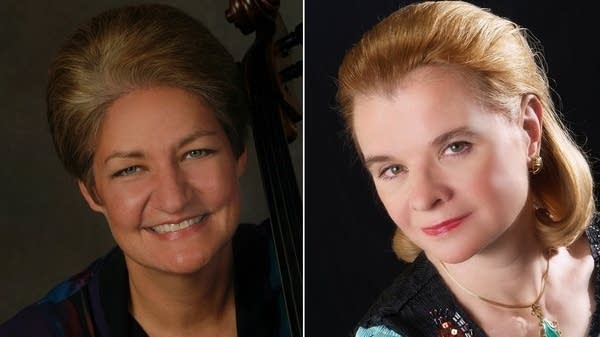Marcy Rosen, violoncello; Lydia Artymiw, piano: Mendelssohn: Complete Works for Cello and Piano (Bridge)
"In Chamber music it's never about an individual voice, it's about the whole, and working with Lydia is always such a joy because it's never about either of us, it's about the music."
That's cellist Marcy Rosen. She first met pianist Lydia Artymiw more than 40 years ago at the Marlboro Music Festival, a coveted chamber music retreat. 25 years would pass before they finally had the chance to work together. They just released their second recording together. It features the complete works for cello and piano by Felix Mendelssohn.
Marcy, you were one of the founding members of the Mendelssohn String Quartet - does that mean you have an affinity for this composer?
MARCY ROSEN: Yes, I love Mendelssohn. It was great producing this body of work and getting to have a real affinity for his style and taste. I think often his music can be played rather aggressively. But it's such lyrical, gentle playing for the most part. So, I'm so happy we were able to present a recording that I think shows the music in a different light.
LYDIA ARTYMIW: Playing Mendelssohn is like playing Mozart, but it's later. Either you can play it or you can't. If you miss a note or something isn't exact, every technical aspect it has to be all there. But the music demands so much more. And I always like to think of the slow movements in the sonatas as songs without words, and then he wrote a song without words for cello and piano, which we also recorded. For me, this is the core of Mendelssohn's music. A song without words.

LA: Mendelssohn actually wrote two of these pieces for his brother, Paul, who was his younger brother and a fine cellist, even though he didn't become a professional. Felix often played with Paul. The Variations are dedicated to him. And then the first sonata was also written for Paul for his birthday about 10 years later. So, the fact that two brothers played together I think has a strong impact on the music.
You both talk about how challenging this music is. Could you each give me an example, perhaps in the Sonata No. 1, that's especially challenging for you?
MR: At the very start of the first sonata, just about 35 measures into the piece, there's a triplet passage for the cello that is actually incredibly tricky and to have to do that at the opening of the piece, without stumbling, I found that quite challenging in performance. It was a little easier to do in the recording because we could do it without pressure, but in a concert situation, that's the place where a bit of tension might creep into you.
LA: I would add, for the pianist, the second movement, which is really an elfin scherzo and reminds me of Midsummer Night's Dream. The middle part is a gorgeous song without words, and then when the A section returns, what Mendelssohn does is he makes the left hand in arpeggiated grace note 16ths, and they have to sound like pizzicati. They have to sound exactly like what the cello is doing there. That is a very difficult passage for the pianist, and it's all in the left hand. Then the right hand plays the theme, and that has to be more legato. So, you have to sound like two different people when you're playing that passage.
What was most memorable for each of you in putting this recording together?
LA: For me, learning the early variations was an absolute joy. I had never even heard them. I knew they existed, but I never had occasion to play them. I knew the two sonatas and the song without words. So just learning this early piece was such an experience. I mean, it's an amazing piece.
MR: I was sort of overwhelmed by the Variations when I heard the final edit of it. I just thought, 'What a fantastic piece.' It's got an incredible arch to the way it's composed, the low moments, the quiet moments are so tender. And I just imagine the two brothers playing that together and just loving it so much.
To hear the rest of my conversation, click on the extended interview above, or download the extended podcast on iTunes or wherever you get your podcasts.
Resources
Love the music?
Show your support by making a gift to YourClassical.
Each day, we’re here for you with thoughtful streams that set the tone for your day – not to mention the stories and programs that inspire you to new discovery and help you explore the music you love.
YourClassical is available for free, because we are listener-supported public media. Take a moment to make your gift today.
Your Donation
About New Classical Tracks®
Host Julie Amacher provides an in-depth exploration of a new classical music release each week.
Subscribe on Apple Podcasts, TuneIn, Radio Public, or RSS.











